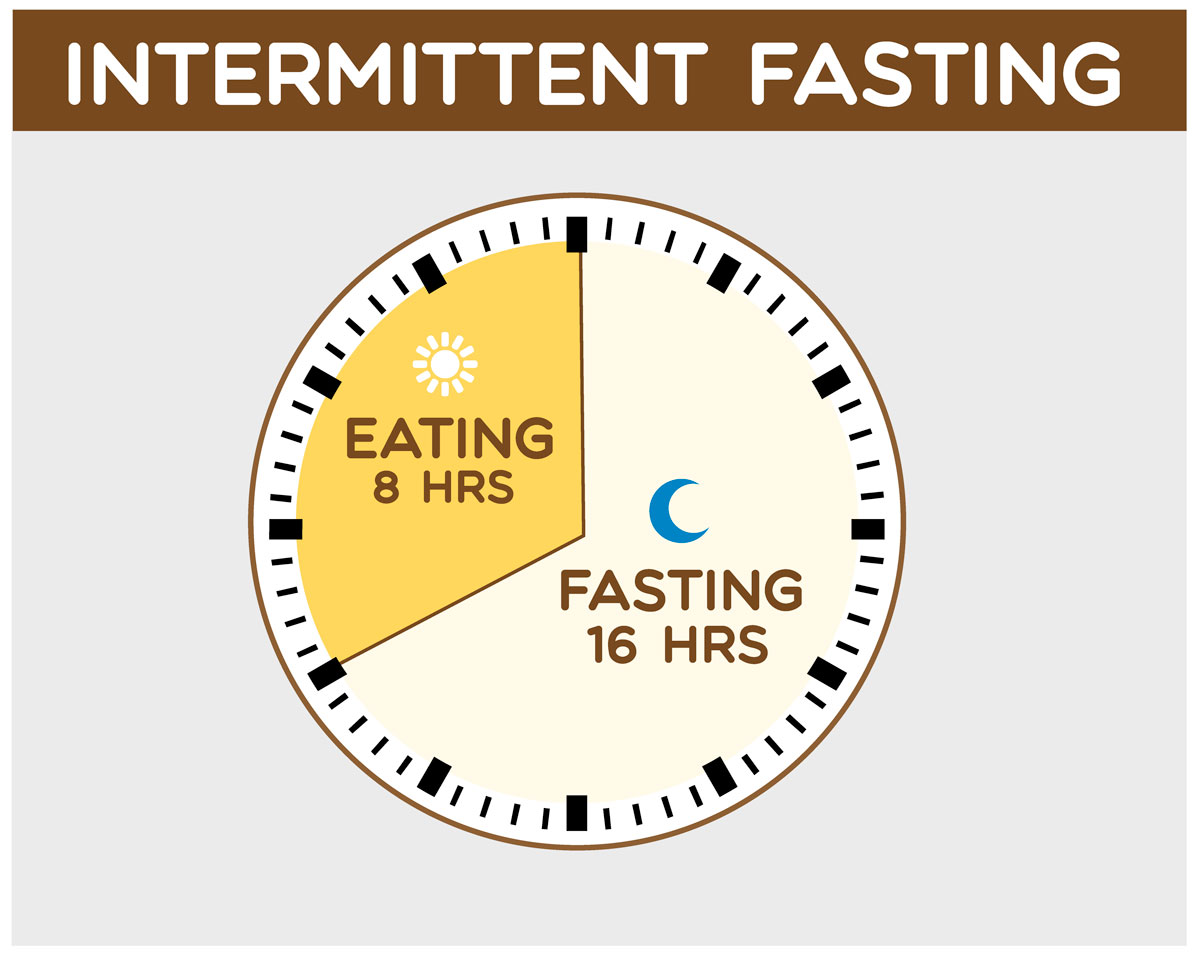Although our predecessors were aware of the advantages of fasting, they lacked the modern scientific knowledge that we do. If an intermittent fasting lifestyle lacked scientific proof of its efficacy, it would fall short in a society where research is the gold standard for determining what is secure and efficient. Scientific groups are more likely to conduct study on fasting diets as they become more popular, which will eventually make the findings available to the general population. A fast online search will turn up a few studies, and undoubtedly more will follow.
The calorie restriction at the core of the practice is typically blamed for the physical effects of an intermittent fasting regimen. This appears to make a lot of sense. Eat less calories to lose more weight. For the average individual, this may be sufficient to explain the situation, but investigations have revealed that a more complicated equation is actually at play. It would be a miracle if you could simply eat less and get the outcomes you wanted. It goes without saying that there are additional elements at work, such as your outlook, heredity, stress levels, and exercise habits. Your life won’t be fully changed by making one straightforward adjustment. In addition to its well-known benefits for weight loss, intermittent fasting has also been proven to help prevent a wide range of harmful health concerns. Although this list is lengthy, let’s focus on a few key items.
Longevity
Studies have found a connection between fasting and a longer lifespan. This has been studied both in the confined environment of a lab and in a wider context. It has been discovered that some of the oldest living people on earth are found in many indigenous societies who incorporate frequent fasting into their way of life. The secret to living a long and fulfilling life is maintaining a healthy weight, and intermittent fasting has been related to weight loss via a kind of circadian rhythm reset. The body is balanced thanks to these rhythms. Disease and illness are more likely to appear when these rhythms are out of balance. Studies on mice have revealed that those that consumed less calories had a lower risk of developing metabolic disease, a finding that also applies to people. The control of hormone secretion is yet another amazing consequence of fasting. Circadian rhythms are linked to hormone control, but intermittent fasting specifically has a beneficial impact on growth hormone release, which may be related to IF’s significant impact on long life.
Digestive
Intermittent fasting boasts a broad range of positive health effects. The body can naturally heal itself with the aid of intermittent fasting, since the list above only scratches the surface. With recently established fasting practices, digestive relief is extremely noticeable. Giving your digestive system enough of downtime in between intake windows is the cause of this. In essence, our digestive system shuts down when we sleep and takes a break until we consume calories again. Therefore, if one fasted in the morning, they would be allowing their digestive system more time to relax and recover. Establishing a regular intake window will enable us to develop a connection with our bodies. We become conscious of our body’s routines and cooperate with them to maintain regularity. This synchronizes with the additional biological processes that we have successfully “reset,” creating a complete mind-body remake that we may then keep up throughout our lifetimes.
The Mind
We’ve seen what happens to the body physiologically when we fast, but what about the more subtle effects? What transpires inside our brains, though? It’s important to note that the brain and the mind are not the same thing. For the sake of this article, we will refer to the mind as our perception and attitude and the brain as the actual processes that occur in our brains. Given this, we must examine the brain in order to properly comprehend the responses that intermittent fasting elicits. Hormone modulation is a key advantage of fasting, as was previously indicated. In the brain, this regulation occurs. The brain is at the forefront of our health worries as it serves as the command center for all of our physiological activities. We discover once more that the positive effects of intermittent fasting cannot be overlooked because it has such a significant impact on our brains.
Our entire physical existence revolves around the brain, which also controls how we feel physically and emotionally. We need to reevaluate everything we have been taught about diet and food in light of the fact that fasting helps with some of the most crucial biological functions. To get the outcomes we want, we must reject society norms that advocate an unhealthy and unbalanced diet. By concentrating on our body’s natural recovery processes, we can achieve this. When our body needs something, it alerts the brain. By fasting, we indicate that we won’t be consuming any calories right away. The brain will respond by slowing metabolic rates in order to conserve energy and fat stores. The body will burn its fat reserves if there is no nearby supply of energy in the form of recently consumed foods. This natural process has proven to be a very secure strategy to lose weight when accompanied with a good diet and exercise.
The Body
The heart was once believed to be the center of all emotional function throughout human history. Contrary to popular belief, science has established that the heart’s primary job is controlling blood flow, which distributes nutrients throughout the body. A common cause of illness and death has historically been heart disease. Unsurprisingly, an intermittent fasting regimen works to combat the causes of heart disease. The primary causes of heart disease are unbalanced blood pressure, excessive cholesterol, diabetes, and obesity, and intermittent fasting has been demonstrated to help control these symptoms. Fasting’s “resetting” impact has helped the heart’s functions heal and synchronize with those of the rest of the body.
A liver
The body’s filtering system is the liver. We are left with poisons and other undesired waste inside of us if the liver is not working properly. Bile, a chemical that aids in intestinal digestion, is also produced by the liver. Many of the advantages of intermittent fasting may be at risk if our livers are not under control. By limiting calories, we give the liver plenty of time to function. The liver may concentrate on its own healing capacities when there are no poisons to filter. One study discovered that the liver releases a protein that controls the liver’s operations when calories are restricted. The majority of the benefits of intermittent fasting are largely dependent on the control and balancing of these natural processes.
Other Important Benefits
All the available scientific evidence supports what many of our ancestors already believed: fasting is very helpful, if not necessary, in the control of our body’s natural healing processes. For any dietary regimen, much less one that is free and natural, this is no little accomplishment. There are even more favorable impacts from incorporating a fasting habit into our daily life in addition to the advantages for our primary organs that are already mentioned above. Here are a few illustrations of IF’s fantastic outcomes:
– Aids in the secretion of growth hormone. Similar results can be reached by taking supplements like HGH, however the efficacy of these drugs is in question. A free and natural regulation of growth hormones would also be preferred, right?
– Aids the body in producing energy by encouraging the development of mitochondria, our cells’ internal power plants. More energy will make it easier to keep up with fitness regimens and any other tasks that call for focus and movement.
– When calorie intake is reduced, the body must burn stored fat rather than searching for sugars from recent meals to burn. Compared to carbohydrates and sugars, fat cells are known as a cleaner energy source. The oxidation of cells will result in less free radical generation, which has been related to cancer.
– Lowers inflammatory response. Cells can be harmed by inflammation, which can also result in immunological disorders and related conditions. When ketones are created by the breakdown of fat cells, intermittent fasting can aid in the repair of damaged cells. In later articles on this blog, we’ll talk about ketones and the ketogenic diet, which both help reduce inflammation.
– Fasting may prevent the body from developing an insulin intolerance. Due to this, either too much or not enough insulin may be generated, leading to the development of diabetes symptoms. In a subsequent chapter, we’ll go into more information about diabetes.
These incredible advantages of IF cannot be disregarded. No other technique can compare to the potential of nature to organically cure the body and restore organ health. But numerous false beliefs also appear along with these positive impacts. There is no scientific evidence to support the assertions made in these myths, which are spread online and enter the brains of thousands of individuals believing them to be genuine.
Frequently Held Myths About Intermittent Fasting
The following are false beliefs concerning intermittent fasting:
Fasting enables you to consume unhealthy food.
Many people think that if you occasionally fast, you can eat whatever you want and yet stay healthy. Simply said, this is false. Your body need food sources of the highest caliber. A pizza does provide some nutrition, but it rarely contains nutrients of good quality. Your body requires a range of nutrients to stay healthy. Simply going on fasts and then eating fast food in between is not a healthy diet and may even work against the advantages of your IF.
Starvation is the same as fasting.
This is a common talking point for those who oppose all forms of fasting. While fasting can burn fat reserves, starving yourself would require using all of your stored energy, which is virtually ever possible to do without getting sick. Furthermore, fasting is an intentional calorie restriction as opposed to starvation, which is an involuntary process. You won’t starve yourself if you take the necessary steps to establish a secure and beneficial intermittent fasting schedule.
Muscle can be lost after fasting.
One of the more fantastical myths in popular culture is this one. Your body uses stored fat cells rather than your muscles as fuel when it lacks rapid energy to burn. Although weak and deteriorating muscles are possible in an unhealthy body, this only happens in severe circumstances where a person is genuinely starving or has protein deficiencies. Direct detrimental effects of intermittent fasting on your muscles won’t occur if you follow a balanced and conscious regimen
Everyone benefits from fasting.
Intermittent fasting is promoted as the secret to good health by many of its proponents. Fasting is not for everyone, though, so let’s be realistic. As we’ve already discussed, not every lifestyle will suit a person. It is common throughout the world for people to be unable to fast due to illnesses or genetic predispositions. If you are unsure about whether or not an intermittent fasting practice is good for you, do some study and speak with a doctor. Fasting might not be effective for you.
Your metabolism slows when you fast.
While your body will adjust to irregular eating during intermittent fasting, your metabolism is not in any way “slowed” by this practice. The only time your metabolism will suffer is if you manage to completely burn up your fat stores. This would effectively be undereating and depriving your body of energy sources, which is not what you want to happen while you fast. When fasting, our goal is to burn fat cells that have been stored in our bodies, but we don’t purposefully want to use all of them, and doing so won’t be beneficial to our health.
We may feel secure in our commitment to a new nutritional viewpoint since we know that intermittent fasting has scientific support. It comes as no surprise that people in earlier centuries understood, even in the absence of modern science and technology, the remarkable benefits of fasting. We can see that the advantages are significant, but what kind of fasting is best for beginners? To emphasize, no one approach will be effective for everyone; instead, we must identify the strategy that best meets our unique needs. We’ll examine the wide range of intermittent fasting techniques in following articles.








